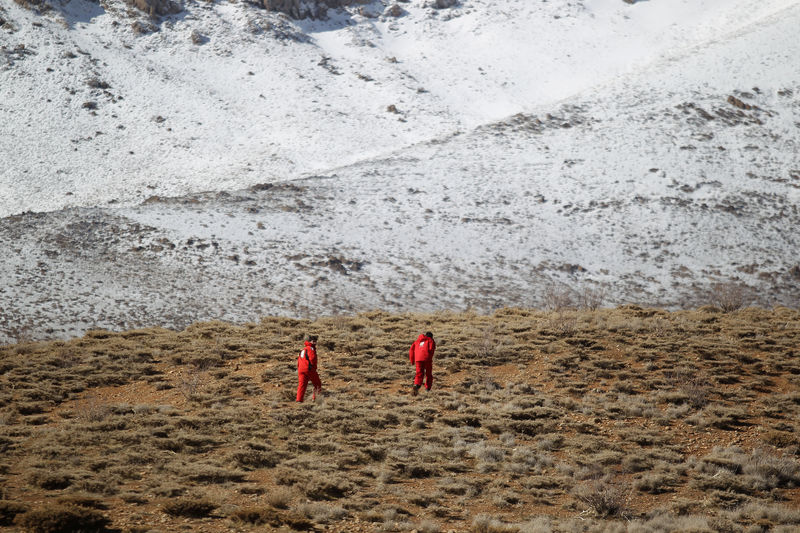 © Reuters. Members of emergency and rescue team search for the plane that crashed in a mountainous area of central Iran
© Reuters. Members of emergency and rescue team search for the plane that crashed in a mountainous area of central IranBEIRUT (Reuters) – The bodies of seven victims of Sunday’s air crash in Iran were brought down from the mountainous crash site on Wednesday, according to Mizan, the official news site of the Iranian judiciary.
There were no survivors among the 65 passengers and crew on the plane that plowed into a mountaintop in southwest Iran.
The bodies of 32 passengers have so far been found and many of the remaining bodies are buried under ice and snow, state media reported.
“The first team that went to the crash site was able to bring back a few of the bodies of those who lost their lives and deliver them to the medical authorities at the bottom of the mountain a few minutes ago,” Mohsen Momeni, the director of the Isfahan branch of the Red Crescent told the semi-official Mehr news agency on Wednesday.
The black box of the airplane has still not been found local officials told state TV.
The Aseman Airlines plane disappeared from radar screens 50 minutes into Sunday’s flight from Tehran to the southwestern city of Yasuj. The Iranian military located the wreckage in the central province of Isfahan on Tuesday morning.
Glacial temperatures and the mountainous terrain hampered search efforts in recent days, adding to the grief and anger felt by families of the victims in a society plagued by risky air travel where officials blame decades of sanctions for the poor state of national fleet.
The twin-engined turboprop ATR 72 that crashed was more than 24 years old. According to data cited by the Flight Safety Foundation’s aviation-safety.net website, it was restored to service just three months ago after being in storage for six years.
More than 100 people demonstrated on Monday outside a local government office in nearby Dena Kooh county, demanding officials step down for their handling of the disaster after announcements that wreckage had been found on Monday were then denied.
Any individuals whose actions may have led to the crash will be confronted, Mahmoud Vaezi, the head of Iran’s presidency office, said Wednesday, according to Mehr.
Iran has suffered several plane crashes in recent decades. Tehran blames U.S. sanctions for preventing it from importing new aircraft or spare parts.
A Boeing (NYSE:) 727 crashed in northwest Iran in 2011, killing 78 people, and in 2009 all 168 people on board died when a Caspian Airlines Tupolev crashed en route for Armenia. In 2003 an Ilyushin-76 troop carrier crashed in southeast Iran, killing all 276 Revolutionary Guard soldiers on board as well as crew.
A deal with world powers on Tehran’s nuclear program in 2015 opened the way for Iranian airlines to update their fleets but many older planes are still in service, particularly on domestic routes.
Fusion Media or anyone involved with Fusion Media will not accept any liability for loss or damage as a result of reliance on the information including data, quotes, charts and buy/sell signals contained within this website. Please be fully informed regarding the risks and costs associated with trading the financial markets, it is one of the riskiest investment forms possible.
Source: Investing.com




























